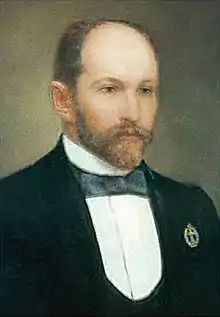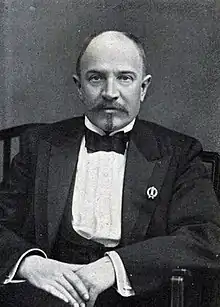Pavel Malyantovich
Pavel Nikolaevich Malyantovich (1869, Vitebsk – January 22, 1940, Moscow) was a Russian politician and lawyer. Minister of Justice of the Provisional Government (1917), Supreme Prosecutor of Russia (1917).
Pavel Nikolaevich Malyantovich | |
|---|---|
Павел Николаевич Малянтович | |
 | |
| 27th Minister of Justice of Russia | |
| In office October 8, 1917 – November 7, 1917 | |
| Preceded by | Alexander Demyanov |
| Succeeded by | Office abolished Georgy Oppokov as People's Commissar of Justice of the Russian Socialist Federative Soviet Republic |
| Personal details | |
| Born | July 4, 1869 Vitebsk Governorate, Russian Empire |
| Died | January 22, 1940 (aged 70) Moscow, Soviet Union |
| Resting place | New Don Cemetery |
| Spouse(s) | Angelina Pavlovna Dara |
| Children | Sons Nikolay, Vladimir, George Daughter Gallia |
| Education | University of Yuryev |
| Occupation | Lawyer, prosecutor |

Family
- Born in the family of a private nobleman.
- Brother – Vladimir Nikolaevich, a lawyer, was shot during the period of repression. His family also died.
- Brother – Vsevolod Nikolaevich (1885–1949), a lawyer, after the civil war, lived in emigration in France, was engaged in journalism.
- Wife – Angelina Pavlovna, nee Dara, first married Kranichfeld, from a Greek family. By the time of the last arrest of her husband, she was blind and was bedridden.
- Sons – Nikolay (lived in emigration), Vladimir and George (shot in the late 1930s).
- Grandson – Kirill Georgievich, a veteran of World War II, a famous Soviet animator and animator (director of cartoons about Dunno and other cartoons), was arrested in 1951, spent five years in prison. He died in 2007 after a serious illness.
- Grandson – Nikita Georgievich, participant of the Great Patriotic War, winner of three orders of the Patriotic War, I and II degrees, paratrooper. Died in 1988 from lung cancer. He was buried at the Vagankovo cemetery (43rd site). The last wife was Natalya Viktorovna, née Telitsina, from the family of the merchants of the first guild of Vorontsov (died on March 26, 2008, Vagankovo cemetery, 1st site).
- Daughter – Galli Pavlovna, in the marriage – Shelkovnikova (1908–1981).
- Pavel Malyantovich until 1917 took on the upbringing of two children of the deceased Bolshevik, assistant attorney Virgil Shantser (Marat).
Education and the beginning of a revolutionary activity
He graduated from high school in Smolensk, he studied at the law faculty of Moscow University. Participated in the opposition movement, in 1889 he was brought to inquiry on the case of the distribution of the revolutionary magazine "Self-Government", in 1890 for three months he was in prison in the case "On the Criminal Community", which was conducted by the Smolensk Gendarme Office. In 1891 he was expelled from Moscow University with the prohibition to reside in Moscow and the Moscow Province. He moved to the Faculty of Law of University of Yuryev, which he graduated in 1893.
Lawyer
Since 1893 – Assistant Attorney, from 1898 – Attorney at Law of the Moscow Court of Justice District. In 1895–1896 he became one of the founders of the workers' advocates' circle, which included young Moscow lawyers: Nikolai Muravyov, Vasily Maklakov, Nikolai Teslenko, Mikhail Khodasevich. They not only did not take money from clients who were involved in political affairs, but also spent their own money on the way to the venue of the process. By 1902 the circle turned into a political defense group.
He participated in many political processes – he was a defender of the workers of the Morozovskaya factory (in 1899; out of 90 defendants 37 were acquitted). During this process, he denied the position of the prosecution, which was the collective responsibility of all the participants in the crowd for its actions. He defended demonstrators in Sormovo and Nizhny Novgorod (1902; among his clients were working Pavel Zalomov, who became the prototype of Pavel Vlasov, the hero of Maxim Gorky's story "Mother"), and participants in the unrest at Tikhoretskaya station (1903). In the same year, he successfully defended the workers of the Khludov pulp mill in the Ryazan Province (accused of unrest and resistance to the authorities) and the Kostroma workers who were accused of "economic hatred" attacks. He was also a defender of the peasants of the Kharkov and Poltava Provinces who were accused of unrest, the workers of Gus-Khrustalny.
Then he was a lawyer not only for workers, but also for other revolutionaries – from 1904 to 1905 he participated in the trial of Nikolay Bauman, Elena Stasova and other members of the Russian Social Democratic Labour Party. During the revolution of 1905–1907, he defended members of the Saint Petersburg Soviet of Workers' Deputies (Lev Trotsky was involved in this process), participants in the uprising on the cruiser Memory of Azov (1906). Total spent over a hundred political processes.
Together with his colleague Nikolai Muravyov, Malyantovich wrote a book "Laws on Political and Social Crimes. Practical comment" (Saint Petersburg, 1910). Actively sympathized with his client, made radical speeches at lawyers' meetings. He participated in the social democratic movement, hesitated between the Bolsheviks and the Mensheviks (he was not officially a member of the party), and was constantly under police surveillance. In 1905 his apartment was a turnout for the Moscow Committee of the Russian Social Democratic Labor Party, whose members defended at the 1909 trial. According to the Police Department, in 1909 he gave the funds to the Russian Social Democratic Labor Party to dig up under a prison in order to free the prisoners.
He won the civil process with the heirs of Savva Morozov, who challenged his will (100 thousand rubles were bequeathed by him to Maria Andreeva for the transfer to the Bolshevik party). Then he received the money by proxy and handed it over to one of the Bolshevik leaders Leonid Krasin. In 1915 he took to his assistant a participant in the revolutionary movement, the Menshevik Andrey Vyshinsky.
Minister of Justice
In September 1917, at the suggestion of Alexander Kerensky, Malyantovich became Minister of Justice of the Provisional Government (fourth composition). Before that, he joined the Russian Social Democratic Labor Party (Mensheviks) in order to represent it in the government. He was conciliatory towards the Bolsheviks, perceiving them as colleagues in the revolutionary movement. Despite this, he signed an order for the arrest of Vladimir Lenin, which was never executed, at the same time he warned Lenin about the impending arrest.
On November 7, 1917, he was arrested along with other members of the Provisional Government by the rebels, and was sent to the Peter and Paul Fortress. A day later, like other socialist ministers, was released.
Activities after 1917
Retired from political activities, he returned to Moscow. The writer Ivan Bunin, who met with him, noted in his diary (on March 12, 1918) that Malyantovich did not perceive the events as a tragedy: "And this is still a holiday, everything from them is like water. Pink, lively". In August 1918 he left for the South of Russia, lived in Pyatigorsk and Ekaterinodar. He was arrested in 1920.
In September 1921, the People's Commissars of Education and Justice Anatoly Lunacharsky and Dmitry Kursky (colleague Malyantovich on political protection) summoned him to Moscow, where he served as legal adviser on the presidium of the Supreme Council of National Economy. He joined the Moscow Board of Defenders, which he headed for some time, was a member of the first staff of the Presidium of the All-Russian Lawyers Association. Participated in the activities of the Political Prisoners Assistance Committee (Political Red Cross).
In 1930 he was arrested in the case of the Union Bureau of the Russian Social Democratic Labor Party (Mensheviks), was in Butyrka prison for several months, in May 1931 sentenced to 10 years in prison, but then released after intercession from the old Bolsheviks.
Last arrest and death
In November 1937 he was again arrested, was in the Lubyanka, in the Lefortovo and Butyrka prisons. He pleaded not guilty. In particular, during the interrogation on January 14, 1939, the investigator's demand to testify about "his counter-revolutionary activities" stated: "I intend to say the same thing today, what I will say tomorrow and the day after tomorrow, that I have never been engaged in counterrevolutionary activities, I have not been in any counterrevolutionary organizations and I have not led them". Malyantovich and his wife turned for help to Prosecutor General Vyshinsky, but he refused.
On January 21, 1940, the Military Collegium of the Supreme Court of the Soviet Union sentenced the 70-year-old Malyantovich to death. On January 22 of the same year, he was shot. Burial place – New Don Cemetery.[1]
Rehabilitated on August 29, 1959.
Participation in the shooting of the film "Lenin in October"
In the book of Yuri Nikulin "Almost Seriously"[2] the following fact is given:
Today I was told about the filming of the film "Lenin in October". When director Mikhail Romm filmed the scene of a meeting of the Provisional Government, he examined the participants for a long time and, stopping against a bearded man, whom everyone jokingly called Chernomor, took him by the beard and exclaimed:
– Why the hell did you stick this broomstick here?
– Sorry, but this is my beard – Chernomor began to justify himself.
During the shooting, the question arose of what orders Kerensky wore and how many adjutants he had.
– Did anyone find out? – Romm asked the crew.
In the ensuing silence came the confident voice of Chernomor.
– Alexander Fedorovich wore only a university badge, and he had two adjutants.
– How do you know where? – Romm was surprised.
– For your information, – answered Chernomor, – I’m a former minister of the Provisional Government Malyantovich.
So the former minister became the chief consultant for all episodes related to the Provisional Government, and played himself in the film.
Although the credits for the film do not include the names of the actors involved in the episodes, the story seems to be confirmed by the significant portrait similarity of Malyantovich's face in the photo and in the film, unlike many other characters.
This record Nikulin made in March 1964. The film was shot in 1937, and in November of the same year Malyantovich was arrested and later shot. The same fact confirms Alexander Solzhenitsyn in the "Gulag Archipelago".
However, with careful viewing of the film "Lenin in October", we can be sure that the role of Malyantovich in the film was played not by Malyantovich himself, but by actor Sergei Tsenin.
Bibliography
- Stay in Your Covenant... Nikolai Konstantinovich Muravyov. Lawyer and Public Figure. Moscow, 2004.
- Nikolai Troitsky. The Advocacy in Russia and the Political Processes of 1866–1904. – Tula, 2000.
References
- Lists of Victims
- Yuri Nikulin, Almost Seriously... – Moscow: TERRA, 1995, Page 542